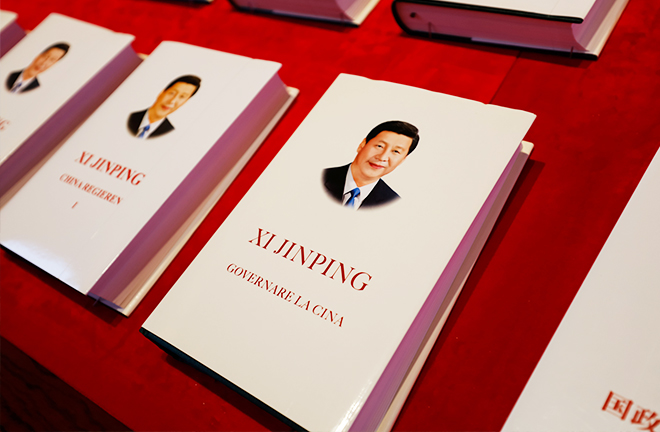Scholars praise China’s governance art

Multilingual editions of Xi Jinping: The Governance of China exhibited at the Museum of the Communist Party of China in Beijing Photo: CFP
The theoretical appeal and tangible outcomes of Xi Jinping Thought on Socialism with Chinese Characteristics for a New Era have emerged as prominent subjects of ongoing research within international academia. In recent interviews with CSST, scholars Stephen Ndegwa, executive director of South-South Dialogues in Kenya, Humphrey Moshi, director of the Center for Chinese Studies at the University of Dar es Salaam in Tanzania, and Washim Palash, a research fellow from Jahangirnagar University in Bangladesh, shared their unique perceptions toward Xi’s thought and governance philosophy, Chinese modernization, and its global impact.
Adapting Marxism to Chinese context
According to the report to the 20th National Congress of the Communist Party of China (CPC), “Marxism is the fundamental guiding ideology upon which our Party and our country are founded and thrive.” Ndegwa noted that essentially, the strength of the Party and socialism with Chinese characteristics stems from the fact that Marxism works. The Party’s struggle history is a process of continuously adapting Marxism to the Chinese context and exploring creative and innovative ideas. This philosophy has now developed substantially and has helped China make unprecedented progress. It is one of the pillars to build a modern socialist country in all respects.
As Moshi perceives, national governance requires planning and layout. Xi’s thought has not only served as a theoretical but also a practical framework that has underpinned China’s economic, environmental, political, and social development. In that regard, it has given rise to an alternative development paradigm, distinct from the Washington Consensus that puts emphasis on Westernization while also disregarding diversity of cultures, civilizations, historical backgrounds, and levels of national development. Xi believes that every country has a right to decide its own destiny without external interference. This philosophy has helped China live above the fray of international conflict.
A visionary leader and thinker
Ndegwa elaborated on his views regarding Xi’s governance ideas, which are extensively documented in the collection of his speeches and writings published in the four-volume Xi Jinping: The Governance of China. This work articulates Xi’s thoughts on domestic politics, his political philosophy in relation to development issues, international relations, infrastructure, technology, the environment, peaceful coexistence, and the military. It reflects Xi’s artful governance and rich talent as a leader of a great country, and serves as a testament to the values and world views of the Chinese people in many respects.
A series of initiatives proposed by Xi are not only a reflection of foresight, but are also attuned to the demands, challenges, and dynamics of the times. At the same time, they are reflective of Xi’s unwavering commitment to globalization and multilateralism, Moshi said.
“In a country’s historical turnings, sometimes the leader’s charismatic leadership, character, and dynamism can play a pivotal role. In this regard, Xi’s philosophy, and approach to internal integration, global connectivity and China-world simultaneous progress seem so balanced,” Palash told CSST.
Moshi continued that there are a number of inspirations which the majority of developing countries can draw from China’s rise: On one hand, neither backwardness nor poverty is a destiny. They can be eradicated provided the right leadership is in place, one that is visionary, selfless, and walks the talk. On the other hand, there is an alternative development model to that Washington Consensus.
However, this is not to be propagated by a simple “cut and paste” of the Chinese model, but rather by the need to borrow a leaf from it, while adapting to a country’s specific circumstances, Moshi added.
Increasing global interconnectivity
Palash stressed that over the past few decades, and particularly in the last decade since the new era, the Chinese leadership approach has been remarkable in terms of economic growth and political stability. This is the key factor that has contributed to the success of Chinese modernization.
The foundation of the growth and stability is attributed to the resilience of the system of socialism with Chinese characteristics, and the combined approach of Chinese management and governance systems, Palash said.
As Moshi pointed out, the disruption of the global supply chains caused by COVID-19 was only temporary, and swift recovery has been observed since early 2023. This is due to the quick recovery of China’s economy from the pandemic. As “the world’s bread basket,” China’s recovery reverberates across the globe, given its role as the main participant of the international system.
China’s journey of modernization has not been easy for the past years as the challenges and risks were both internal and external, Palash said. Despite the global recession and economic downturn, and the fact that many countries have not recovered from the COVID-19 pandemic, China has addressed the challenges much smarter and more effectively.
Ndegwa summarized that the concept of living in a global village has now become more apparent than ever before. Insecurity, climate change, and economic recession, among other challenges are now transboundary. The COVID-19 pandemic has also shown us that no one is safe from natural vagaries and the baggage that comes with them.
“To survive the current challenges and leave a healthy future for [our] progeny, we must realize that we are a global community with a shared future. Countries that attempt to isolate themselves through protectionism and unilateralism in order to have power over others are bound to suffer from the backlash from the rest of the international community,” Ndegwa said.
Edited by CHEN MIRONG
